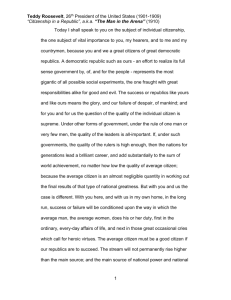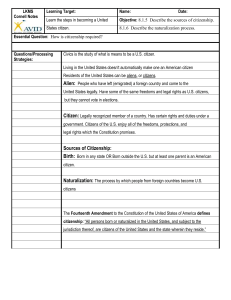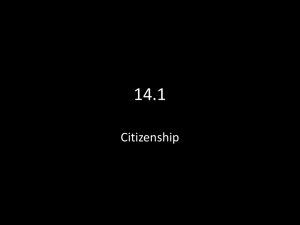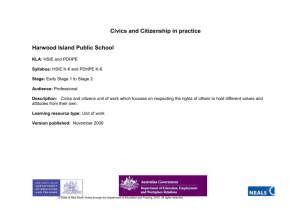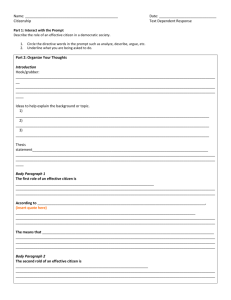See More
advertisement
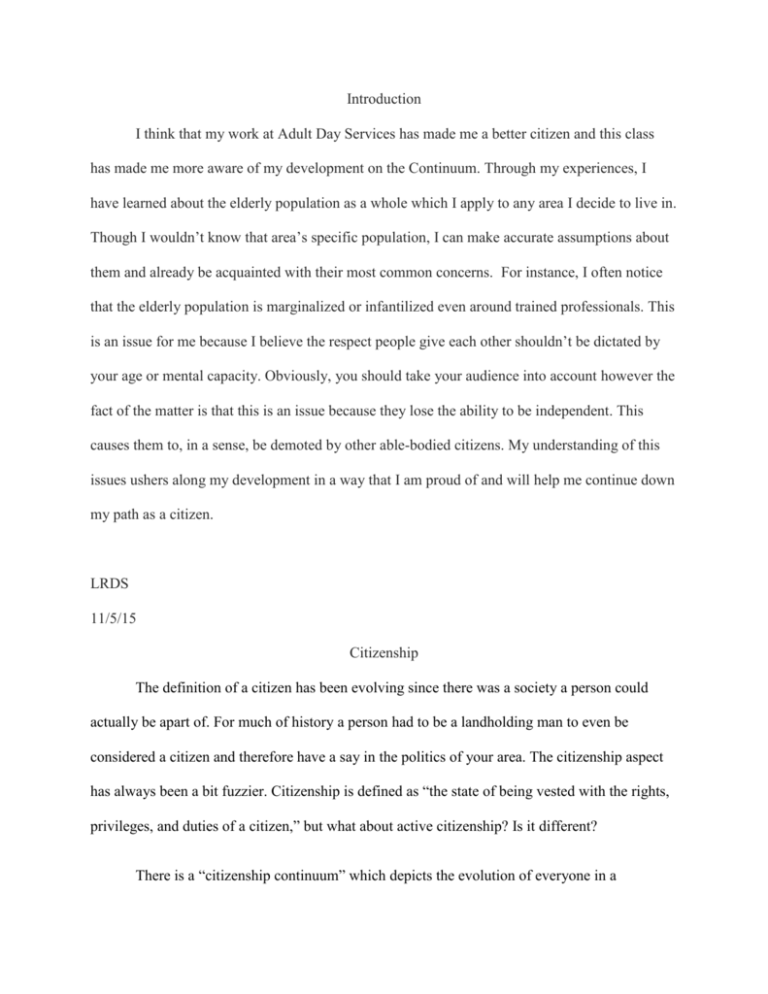
Introduction I think that my work at Adult Day Services has made me a better citizen and this class has made me more aware of my development on the Continuum. Through my experiences, I have learned about the elderly population as a whole which I apply to any area I decide to live in. Though I wouldn’t know that area’s specific population, I can make accurate assumptions about them and already be acquainted with their most common concerns. For instance, I often notice that the elderly population is marginalized or infantilized even around trained professionals. This is an issue for me because I believe the respect people give each other shouldn’t be dictated by your age or mental capacity. Obviously, you should take your audience into account however the fact of the matter is that this is an issue because they lose the ability to be independent. This causes them to, in a sense, be demoted by other able-bodied citizens. My understanding of this issues ushers along my development in a way that I am proud of and will help me continue down my path as a citizen. LRDS 11/5/15 Citizenship The definition of a citizen has been evolving since there was a society a person could actually be apart of. For much of history a person had to be a landholding man to even be considered a citizen and therefore have a say in the politics of your area. The citizenship aspect has always been a bit fuzzier. Citizenship is defined as “the state of being vested with the rights, privileges, and duties of a citizen,” but what about active citizenship? Is it different? There is a “citizenship continuum” which depicts the evolution of everyone in a community as they develop from just a member to an active citizen. A member is depicted as “not concerned with his/her role in social problems.” The person then can then evolve into a “volunteer,” Who is described as “Well-Intentioned but not well-educated about social issues.” Then a “conscious citizen,” who in interested it the causes of things and asks questions, and ultimately an “active citizen.” The pinnacle active citizen allows the “community [to] become a priority in values and life choices.” Citizenship is not only partaking in your area but really valuing it and understanding why it is needed. What makes a person want to transition from a volunteer to an active citizen is equally important. In the “Social Change Model of Leadership Development”, there are seven “C’s” that make up an outline for leadership. I feel the very first “C” is the most important one. It is consciousness of self which is described as, “Being aware of the beliefs, values, attitudes and emotions that motivate one to take action.” An active citizen must have a reason for serving in the community in whatever capacity they choose so I believe the motivation behind the actions are just as important. For instance, in Pipher’s “Reluctant Activist” she reads about the Keystone XL pipeline that would plague her area and the world if nothing was done about the environment being exploited. She became a very active citizen and an influential voice along with her group of followers to try and fix what they could while preventing actions that would make matters worse. While being a very active citizen Pipher outlines the flipside to being so involved and informed. The weight of this new knowledge bogged down Pipher so that she wanted to shake people and wake them up from their blissful ignorance. She also thought of her grandsons’ future and what it would be like if nothing changed. This terror certainly drove her to act but it also caused endless worry. This helps me understand why there are not more active citizens but rather more members of the other stages of the spectrum. Because it is often startling to be enlightened, it is easier to be passive and uninterested rather than trying fighting a seemingly unwinnable battle. “Leadership is Everyone’s Business,” by Kouzes states, “Leadership is not an affair of the head. Leadership is an affair of the heart.” This same concept goes along with active citizenship because to change something as important as your own community will not only directly effect you but your loved ones as well. This personal connection is often the drive that causes people to become engaged in their community. That being said, active citizenship is actually a relatively new phenomenon in, “mature industrialized democracies.” (Marinetto, 2003). Because citizenship is now broader among populations and politics today focuses more on what people want (whether that’s a good thing or a bad thing) people can choose to become more involved than they used to be. In Block’s article, “From Leadership to Citizenship,” he points out the current glorification of leaders in South Africa, such as Nelson Mandela, “The leaders of that country are more products of the culture and its people than creators of it. Leadership in this era is more effect than it is cause. To keep focusing on the selection, training, and definition of leaders is to keep us frozen in the world of monarch, autocrat, and entitlement. It postpones the day when we will experience a world of community and accountability.” Because politicians today more readily reflect the views of their people, they are automatically put on a pedestal and considered great or revolutionary when they were really just a voice for their people. These are the kind of citizens that make it hard to think of active citizens as everyday people. In Jones’ article, “Towards Designing for Equity” he outlines what citizen participation does and its effects, “Citizen participation prioritizes mechanisms of civic engagement in political processes and policy formation, providing an opportunity for the public to express opinions and exert influence on a wide variety of issues. [2] Arnstein's (1969) ladder of citizen participation relates this concept to citizen power, more specifically the redistribution of power that ensures a voice for those previously left unheard.” This means that it is not really the leaders that are in power but the active citizens who back them up. Bidzina Ivanishvili, the Georgian Prime minister recently stepped down. The prime minister claimed that he was done with politics for as long as the country was alright without him and that he would focus on being an active citizen and focus only on what he called “the social function.” A “Politics & Society” article summarized his resignation letter saying, “he believes he has performed the state and political functions more or less well, and his friends from the coalition will better continue the cause he started. As for the social function, "the scope of activities here is huge," he said.” He brought to light the necessity for active citizens by becoming one and since he is a man of power, he will have many resources to be a powerful active citizen while encouraging others to do so by leading by example. Kouzes asked “How can we co-create new social realities?” To create any new realities, we would first need to overcome what ever kinds of prejudice exist and are supported/were created by the old social realities. Education would help people to understand better and probably be more open-minded to change or challenge current norms. That same education can inspire college kids who are already, statistically, more accepting and argumentative to instate new norms, such as being an active citizen, which everyone would follow. Virginia Tech has many outlets through which their students can practice active citizenship. The VT Engage office is one of the many perks of going to such a service oriented school. The office contains numerous opportunities for students to get involved in the New River Valley area and around the world. This is all in efforts to create an area that no longer suffers from hunger and poverty which are more common in this area. Because Ut Prosim is our school’s motto, we get opportunities to live that out. The “Big Event” is one big project where we can help out the community members with different projects however majority of the students are not informed enough to be considered active citizens. The school does an excellent job supporting these actions and helping the students find opportunities to live out Ut Prosim however, because the education behind the issues often isn’t there, they cannot understand their impacts and therefore cannot be active citizens. In this case Virginia Tech would actively encouraging service but not the development of their students into active citizens. I believe a meeting or gathering before the students go out to work on their projects would be beneficial so they could understand their impacts on the New River Valley. Students would be encouraged to participate more and become active citizens if they realize that there was a greater need for it. All students really need is to come into contact with a cause which they see worthy, something that would align with their beliefs or engage them. They need to be exposed more and motivated, which admittedly, is a difficult state to get college aged people to be. There are typically good turnouts for guest speakers that come here and to have people that are passionate about issues is contagious. I think having someone with energy would make people want to engage in whatever issue they’re speaking on. I have learned a lot this semester however, I don’t believe that I have really evolved into the “active citizen” just yet, though I am sure that I am at the very least a “conscious citizen” on the continuum. This class has really opened my eyes to the issues that can accompany volunteering. Not only did I just blindly assume all volunteering was good volunteering but I also thought of the people I was serving as needy or unfortunate. I’m very glad my eyes could be opened so that I could be more selective on trips or try and become educated on the projects that I am working on. The work that is just a Band-Aid on an issue is no longer enough, I now understand that issues often run much deeper and so cannot be fixed by a week mission trip or by throwing money at it. People must really commit to their service as much as they can and understand that all people need but those who might need more are not to be considered “needy.” Furthermore, education is still one of our most powerful tools and should be more often synonymous to service. I have been volunteering on a weekly basis with Adult Day Services, or ADS. Working with the elderly and adults who are mentally handicapped has made me realize how fragile people are and how necessary it is for them to retain independence, with in reason, because it helps them feel still in control. There is one worker there that tends to baby the participants and it’s almost comical how obvious they are about disliking it while she continues. She always means well and does genuinely care for them however because she chooses to baby them over letting them find something to do on their own she takes away the little freedom they have and covet. This issue is often overlooked because the elderly or mentally ill population are often swept under the rug because they remind us how easily we could be like or become like them. I plan on becoming more engaged in this issue by continuing to work at ADS and finding outside opportunities both in my area and in the New River Valley. Work Cited Astin, Helen S., and Alexander W. Astin. "The Model." A Social Change Model of Leadership Development: Guidebook: Version III. Los Angeles: Higher Education Research Institute, U of California, Los Angeles, 1996. N. pag. pdf. Block, Peter. "From leadership to citizenship." Insights on Leadership: Service, Stewardship, Spirit, and Servant-leadership. Ed. Larry C. Spears, New York: Wiley,1998. 87-95. Print. Jones, Christopher R., et al. "Towards Designing for Equity: Active Citizen Participation in eHealth." Transforming Government: People, Process and Policy 6.4 (2012): 333-44. ProQuest. Web. 10 Nov. 2015. Kouzes, James M., and Barry Z. Posner. "Leadership Is Everyone's Business." The Leadership Challenge. 3rd ed. San Francisco: Jossey-Bass, 2002. 383-98. pdf. Marinetto, Michael. “Who Wants to Be an Active Citizen? the Politics and Practice of Community Involvement”. Sociology 37.1 (2003): 103–120. Web Pipher, Mary. "Reluctant Activists." The Impossible Will Take a Little While: Perseverance and Hope in Troubled times. By Paul Rogat Loeb. New York: Basic, 2014. 113-21. Print. Block, Peter. "From leadership to citizenship." Insights on Leadership: Service, Stewardship, Spirit, and Servantleadership. Ed. Larry C. Spears, New York: Wiley,1998. 87-95. pdf. "Politics & Society; Georgian PM Ivanishvili Determined Toleave Politics, Become "Active Citizen"." Interfax : Central Asia & Caucasus Business Weekly (2013)ProQuest. Web. 10 Nov. 2015. The Active Citizen Continuum. N.p.: Break Away: The Alternative Break Connection, 2015. pdf.

